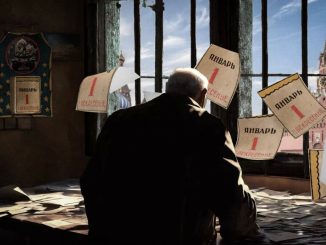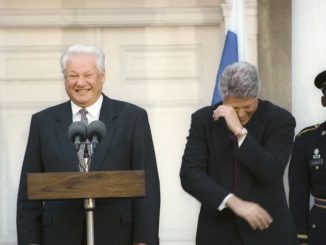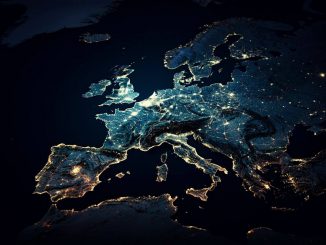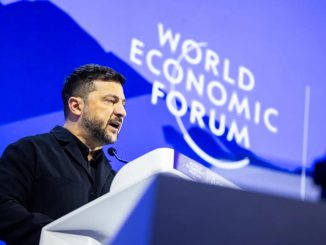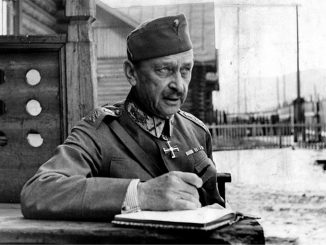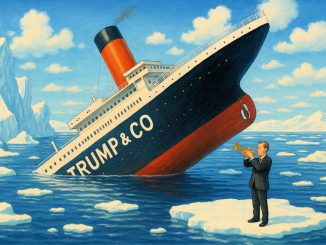The Anchorage Summit, held on August 15, 2025, between US President Donald Trump and Russian President Vladimir Putin, is presented by Laure Mandeville as a « tragicomic illustration » of American diplomatic failure. Far from being a negotiation, it was a « meticulously executed Russian psychological operation » resulting in a « strategic triumph for the Kremlin and a profound, self-inflicted humiliation for the United States. » The summit exposed the « ascendancy of a calculating master of the Kremlin over the « drunken boat » of American diplomacy, » with Putin using Trump as a « prop in a drama of his own country’s debasement. » The core message is that the US, driven by presidential ego and strategic incompetence, inadvertently legitimized Putin, eroded its own credibility, and dangerously imperiled the European security order by pressuring Ukraine to accept territorial concessions. Editor’s note
by Laure Mandeville,[*] Special Envoy in Anchorage (Alaska) — Anchorage, Alaska August 18, 2025 —Courtesy Le Figaro
Upon taking office last January, Donald Trump dreamed of being a peacemaker and a champion of an America rediscovering its greatness in a world devoted to commerce. Since then, in less than six months, he has mediated long-standing conflicts, some of which had resisted even the most seasoned diplomats, such as the one between Azerbaijan and Armenia. On a more warlike note, Trump has also shown that he is ready to use force to enforce nuclear non-proliferation, by bombing Iran.
But a colossal iceberg lies before him. That of the war of aggression led by Putin in Ukraine, and more broadly, of Russian imperial revisionism. As the Anchorage summit clearly showed, the American president, alas, gives no impression of being able to exert on this subject the balance of power he has favored elsewhere. As if Russia and its Chekist tsar impress him to such an extent that he loses his judgment.
Having set out to end the war in “24 hours,” according to campaign promises made with a levity and naivety that only the ignorant can possess, Donald Trump has learned the hard way that he was tackling a complex matter. Six months of efforts have yielded nothing and had led the American to harden his tone. The summit he improvised on Friday in Anchorage, with the stated objective of securing a ceasefire from the master of the Kremlin, proved to be a failure, as Trump did not renew the threat of severe sanctions he had previously mentioned.
Putin had warned that he remained determined to “tackle the deep roots of the conflict,” which, in his coded language, means he wishes to gain control of all four partially conquered Ukrainian regions, in addition to Crimea, but also to obtain Ukraine’s renunciation of its entry into NATO, as well as a say in its partial demilitarization. A ceasefire was never on the agenda for him, as his goal remains to control Ukraine’s destiny.
“Negotiating will be difficult. Maybe Putin doesn’t want peace. The Russians are like that, they make war,” Trump had acknowledged before the trip to Anchorage. These statements make the organization of the meeting inexplicable. Was the Russian position poorly assessed by his envoy Steve Witkoff, who has shown astounding incompetence on the Russia file? Did the president show excessive confidence in his powers of persuasion? “Since flattery works on him, Trump thought it would work on Putin!” notes one observer.
In the wake of the Anchorage summit, Trump invited Volodymyr Zelensky to the White House this Monday, with the hope of moving quickly towards peace and the organization of a tripartite summit—an idea the Kremlin currently rejects. Trump has abandoned the idea of a preliminary ceasefire to embrace the idea, promoted by Putin, of direct negotiations for a peace agreement. This scenario allows the master of the Kremlin to continue shelling the cities of Ukraine. The great concern now is that Donald Trump will embrace Russia’s position on territorial concessions and impose a deal on Zelensky. In short, that he will force him into an unacceptable surrender by threatening to cut off his supplies.
“What advice would you give Zelensky, after Anchorage?” television host Sean Hannity asked Trump. “Take the deal. Russia is strong. It’s a great power, Ukraine is not,” the president replied. Several European heads of state will be present to help convince Trump not to accept the unacceptable. Their idea would be to advocate for the acceptance of a long-term ceasefire on the front line, which leaves the occupied regions under Russian control, without accepting the de jure recognition of Muscovite authority. But also, and above all, to work on establishing strong security guarantees that allow for the survival of an independent Ukraine capable of rebuilding and defending itself on 80% of its territory.
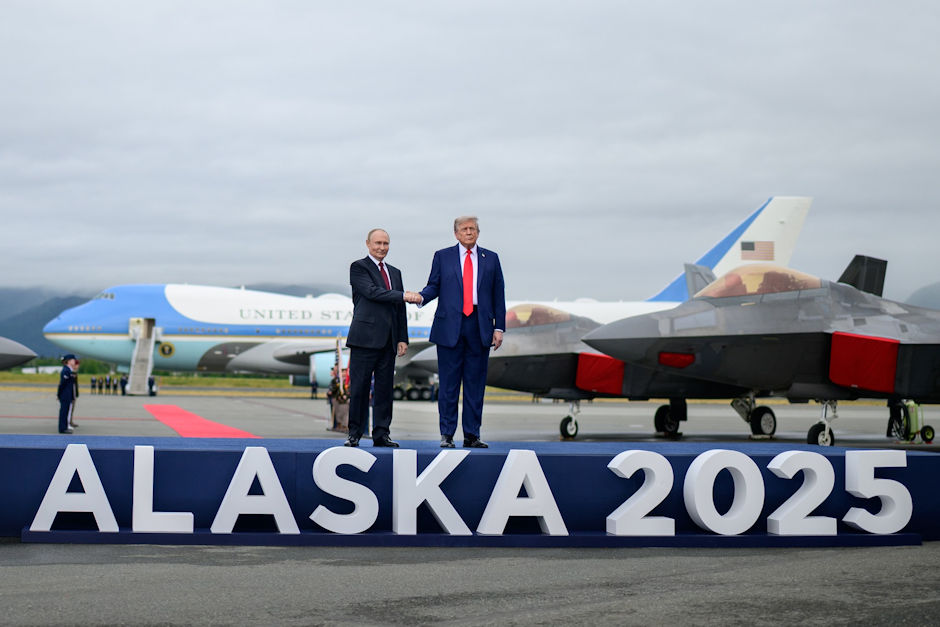
“It was unbearable to watch, and I said to myself seeing this spectacle: is this really my country, allowing itself to be humiliated by bowing down before a former KGB officer who is responsible for the deaths of hundreds of thousands of people?” commented strategist Andrew Michta this Saturday, a keen expert on Russia and strategic relations. “Have we become this weak and incompetent?”
A rare piece of good news in this picture, Trump has proposed that the Americans participate in these guarantees. An approach previously refused by the White House. But their exact content remains vague. It could involve logistical and military aid to potential European contingents deployed in Ukraine.
Generally, all these reversals give the impression of a drunken ship, tossed about by presidential moods, as well as a profound ignorance of the adversary and a lack of reflection on the moral rules that would be essential to establish from the outset.
The Anchorage summit was an example of this, leading to a self-inflicted humiliation. The despot who caused the deaths of more than a million people was offered spectacular legitimation on a silver platter by being received on American soil, moreover on former Russian land, Alaska. And this with no concession in return.

Map: The Russian occupation of Ukraine
- Ukrainian territories controlled by the Russians on August 15, 2025 (including since 2014)
- Territory of Donbas still under Ukrainian control, to pass to Russian control
- Part of the Ukrainian oblasts annexed by Russia still under Ukrainian control and to remain so
- Other currently occupied Ukrainian territories that could be returned to the Ukrainians
- Limits of the 4 Ukrainian oblasts annexed by the Kremlin on September 30, 2022
- Possible exchange of territories, according to Moscow
Wanted by the International Criminal Court, the former KGB officer was welcomed with a profusion of honors, from the rolling out of the red carpet on the tarmac to the applause of Trump, who came to greet him before taking him into his presidential Cadillac. The American also gave him the floor first during the press briefing, from which questions were banned. While hundreds of Russian missiles fall on Ukraine every day, all of this had something indecent about it, including the slogan of the meeting, “In Pursuit of Peace,” when Putin is the one who started the war… Russian media concluded that their leader had been reintegrated into the international game, and that Russo-American relations were normalizing.
“It was unbearable to watch, and I said to myself seeing this spectacle: is this really my country, allowing itself to be humiliated by bowing down before a former KGB officer who is responsible for the deaths of hundreds of thousands of people?” commented strategist Andrew Michta this Saturday, a keen expert on Russia and strategic relations. “Have we become this weak and incompetent?”
Wanted by the International Criminal Court, the former KGB officer was welcomed with a profusion of honors, from the rolling out of the red carpet on the tarmac to the applause of Trump, who came to greet him before taking him into his presidential Cadillac. The American also gave him the floor first during the press briefing, from which questions were banned. While hundreds of Russian missiles fall on Ukraine every day, all of this had something indecent about it, including the slogan of the meeting, “In Pursuit of Peace,” when Putin is the one who started the war… Russian media concluded that their leader had been reintegrated into the international game, and that Russo-American relations were normalizing.
“It was unbearable to watch, and I said to myself seeing this spectacle: is this really my country, allowing itself to be humiliated by bowing down before a former KGB officer who is responsible for the deaths of hundreds of thousands of people?” commented strategist Andrew Michta this Saturday, a keen expert on Russia and strategic relations. “Have we become this weak and incompetent?”
The enthusiasm with which Trump spoke of his “close relationship” with his guest during their brief press conference increased this impression of a president fascinated by Putin. This fascination remains one of the great mysteries of the Trump era since 2015. In 2022, the billionaire went so far as to say that the invasion of Ukraine was a “stroke of genius” before mistreating Zelensky in the Oval Office. Since then, he has seemed to lean towards a more pro-Ukraine view. But the pro-Putin inclination persists. As if he cannot get over this bilateral relationship, which he would have liked to develop to counterbalance China. Some see it as proof that the New York billionaire was once recruited by Russian services. Others, as an expression of his penchant for authoritarian regimes.
The two men form a singular pair in the history of Russo-American relations. Trump is the embodiment of a Western revolt that wants to revise the results of post-1991 globalization, which he believes, rightly so, has despoiled the American working classes that brought him to power. Putin is the number one insurgent of the anti-Western revolt, which he leads by claiming to be the head of the anti-colonialist movement while being an imperialist, and by positioning himself as a defender of conservative values. He presents himself as the leader of the European civilization that the West has allegedly corrupted. Trump, too, which brings them closer.
But the two men are in reality very different, and not just because one comes from a democratic system and the other from a country that has never been one, apart from the 1990s. Trump is a hot-blooded emotionalist with a visceral instinct. He manages by sight, fumbling to test the ground, even if it means abruptly changing his stance. Putin is a cold-blooded animal who sizes up his adversary in advance, despite certain angry outbursts. His domain remains hybrid warfare and psychological destabilization.
But what distinguishes them most are their objectives: “Putin thinks long-term: win the war, make Ukraine capitulate while gradually dismembering it using the salami technique,” says Russia expert Françoise Thom. “To co-opt his American interlocutor to carry out his project, even if the economic figures are plummeting, and if his imperial obstinacy leads the country towards an ethical, demographic, and political abyss.” For him, America must be the major interlocutor. The re-establishment of this link restores Moscow’s status. But for the former Chekist, Washington also remains the fundamental enemy.
Trump, on the other hand, is a short-term transactional player, who believes in the virtues of commerce and thinks that interest is a major factor in international relations, which should make it possible to do business with Russia. He wants to draw Putin onto the field of rationality, without understanding the extent to which passions affect international relations.
After the Anchorage summit, analysts note, however, and rightly so, that the outcome could have been much worse.
The sequence did not result in an “Arctic Yalta,” notes Max Boot in The Washington Post. Unlike Roosevelt and Churchill, who had endorsed Stalin’s domination over Eastern Europe, Trump did not, for the moment, side with his “friend” to force Zelensky to capitulate. According to Yuri Shvets, a former KGB officer who defected to the United States, it is likely Marco Rubio who should be thanked, as the Secretary of State embodies, within the Trumpist team, the wing of firmness against Putin.
The reality is that a battle is still ongoing between the strategists of the MAGA movement, who favor a low-cost peace and a revival of relations with Moscow, and the Reaganite conservative hawks, aware of the danger of the Putin regime. Depending on the moment, Trump has seemed to lean towards one or the other of these camps. While Trump has moved closer to Ukrainian positions, he remains heavily influenced by the opinion of the “realist pacifists” of the MAGA camp. Mario Loyola of the Heritage Foundation is one of them. For him, “Russia is reclaiming its rights over its historical territory, since Ukraine now wants to make its way to the West.” As long as it remained aligned with Moscow, its independence was tolerable for Putin. “But Russia cannot accept the departure of Crimea and the regions that lead to it, its access to the sea for centuries,” he asserts. Loyola therefore thinks that the only solution for Ukraine is to “exchange these territories for its independence.” “This war must stop, our strategic interests with India or China are being thwarted because of the sanctions we must wield,” he says, underestimating the strategic danger that Russian aggressiveness represents for the United States. For him, the essential point for the Ukrainians should be to negotiate security guarantees given by Europe, as the United States has “no particular strategic interest in Ukraine.”
This discourse reflects the psychological context in which Trump is immersed as Zelensky and his European partners arrive in Washington this Monday. “There are two scenarios today,” summarizes The Wall Street Journal: “Ukraine could lose territory but survive as a sovereign and secure, though diminished, country. Alternatively, it could lose both land and sovereignty, and fall back into the Russian sphere of influence.” An alternative that seems to signify that America would be ready to accept the definitive loss of territories for Ukraine, and thus to legitimize a dynamic of aggression. A dynamic that is dangerous for the future, because appetite comes with eating. One of the questions will be to see how far the Europeans will go to oppose it. Through these crucial details, which we delude ourselves into thinking are of local significance, the future of Europe and the free world may be being decided. Unless Moscow refuses to listen and continues the war.
Laure Mandeville
[*] Laure Mandeville holds a degree in Russian and Polish and is a graduate of the Institut d’études politiques de Paris and Harvard University. She was a correspondent for Le Figaro in Moscow (1997-2000). Head of the America desk in Washington (2009-2016), she has been in charge of major investigations on Europe and the United States at Le Figaro since 2017. She has published several books, including one on Donald Trump that is well worth rereading…
- L’Armée russe, la puissance en haillons, 1994, No 1
- La Reconquête russe, Paris, Grasset, 2008 (Prix Louis-Pauwels 2009)
- Qui est vraiment Donald Trump ?, Paris, Éditions des Équateurs, 2016
- Les Révoltés d’Occident, Paris, Éditions de l’Observatoire, 2022
- Quand l’Ukraine se lève, avec Constantin Sigov, Paris, Talent Éditions, 2022
[**] Artikel aus dem Französischen übersetzt von Tobias Kampmann.
[1] Mandeville, Laure. „À Anchorage, l’ascendant du maître du Kremlin face au bateau ivre de la diplomatie américaine“. (In Anchorage: Der Kreml-Chef hat die Oberhand über die fahruntüchtige US-Diplomatie) Le Figaro, 18. August 2025, S. 2.
[2] Siehe auch: ‘The Drunken Ship Facing the Kremlin Iceberg‘ — (2025-0818) —
[3] Thom, Françoise. « Poutine, la stratégie du chaos et le piège ukrainien. » The Trump administration is in the process of rescuing Putin’s regime, which it needs in order to extort money from Europe, according to Françoise Thom, ahead of the meeting between Trump and Putin » in Le Monde, August 14, 2025, p. 22. (The Anchorage Gambit: Anatomy of a Self-Inflicted Humiliation) Le Monde, August 17, 2025.
[4] Siehe: « Anchorage – Un sommet de symboles, pas de substance » — (2025-0816) —
See Also:
- « In Anchorage, the Kremlin Master’s Ascendancy over the Drunken Ship of American Diplomacy » — (2025-0825) —
- « In Anchorage: Die Vormachtstellung des Kreml-Chefs über das trunkene Schiff der amerikanischen Diplomatie » — (2025-0825) —
- « Le bateau ivre face à l’iceberg du Kremlin » — (2025-0818) —
- нкоридж, або дипломатія приниження » — (2025-0818) —
- « Das betrunkene Schiff vor dem Kreml-Eisberg » — (2025-0818) —
- « The Drunken Ship Facing the Kremlin Iceberg » — (2025-0818) —
- « La diplomatie de l’humiliation » — (2025-0818) —
- « Анкоридж, або дипломатія приниження » — (2025-0818) —
- « Gipfeltreffen in Anchorage: Trump in der russischen Falle » — (2025-0818) —
- « A Call for Strategic Lucidity in the Diplomatic Fog » — (2025-0818) —
In depth:
The Anchorage Summit, held on August 15, 2025, between US President Donald Trump and Russian President Vladimir Putin, is presented by Laure Mandeville as a « tragicomic illustration » of American diplomatic failure. Far from being a negotiation, it was a « meticulously executed Russian psychological operation » resulting in a « strategic triumph for the Kremlin and a profound, self-inflicted humiliation for the United States. » The summit exposed the « ascendancy of a calculating master of the Kremlin over the « drunken boat » of American diplomacy, » with Putin using Trump as a « prop in a drama of his own country’s debasement. » The core message is that the US, driven by presidential ego and strategic incompetence, inadvertently legitimized Putin, eroded its own credibility, and dangerously imperiled the European security order by pressuring Ukraine to accept territorial concessions.



